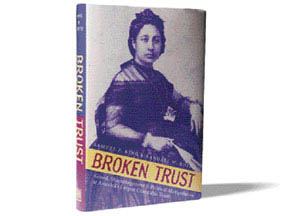 | ||||||||
|
|
Justice is meted out to all but the anointed onesThe mission statement of the Judiciary Branch boldly proclaims "Justice For All." As an employee of the JB, I suggest the mission statement be revised to read more like "Justice for all, except for the few." The real fact in the JB is that "the few" are exempt from justice.How could one be exempt from justice, you may ask. The requirement is a simple one-step process. If you happen to be one of the five Waihee-appointed justices as indicated by the recent series of "Broken Trust" excerpts, you meet the exception. For your information, this select group of individuals also includes a CJ. If you happen to belong to this group of elite individuals, "the few," unethical judicial conduct in selecting a Bishop Estate trustee is overlooked and you will escape justice free and clear. I object, you may say. Sorry, can't do that! You are not an appointed/anointed one. Like little fish in an ocean pond full of hungry sharks, your opinion does not matter, especially when anointed ones are involved. You do your own thing and look the other away like good little fish are supposed to. As an additional argument for a wording change as it applies to the JB, the words "lucky you live Hawaii" should be revised to say "shame you live Hawaii." As you can see, the mission statement of the JB must be reworded to reflect the way we operate. I strongly suggest a change -- soon!
Edward Naihe Ewa Beach
How many more children could have been helped?As I read through the articles, I remember many instances in my 30 years of living in Hawaii when I praised the school but wondered about the trustee system. I worked and was educated at the University of Hawaii, with a background in real estate and law. There were times I was out in public and saw trustees having a meal with a well-known figure. One wonders what sort of deal was being discussed.I also look back on many friends and their children who have been educated at Kamehameha Schools and how it always showed in their lives. So many of those children who called me "auntie" have gone on to make family so proud. I read the paper here on the West Coast and want to march so it will always be a school for the native children as the Princess intended. The best I can say is shame on those trustees and the Supreme Court justices who didn't play by the rules. How many more children would have been helped by a better education? Remember that not every parent can work two or three jobs to make all the opportunities available. Hawaii must never forget what happened. We can hope that the laws in place will prevent it, and that there will always be accounting open to all eyes. Many of us who have lived and loved our adopted state are gone but always interested in it being the first state instead of the 50th.
Patricia A. Bost Tacoma, Wash.
Only Hawaiians should meddle in trust affairsThe Kamehameha trust is a Hawaiian issue. If you're not Hawaiian you have no business meddling in Hawaiian affairs. The Kamehameha trust, like the Crown land trust, also known as the ceded land trust, is the private property of the proper claimants, the Kanaka Maoli Hawaiian people.Hawaiians can trace their unbroken title to the property from the Great Mahele of 1848, the reference point used by the U.S. courts until today to determine proof of title in regard to lands in Hawaii. If you're not Hawaiian, go lobby your leaders from the United States, Europe, Japan, China, Korea, Philippines, Portugal and Israel to set up a trust for you. In the meantime, stop meddling in Hawaiian affairs. A very wise kahuna from Palolo Valley once said, "Burn not thy fingers to snuff another man's candle."
Eric Po'ohina Kailua
Courage came forth to bring back integrityIt took the murder of her husband to turn a housewife into a presidential candidate and overthrow a dictator in the Philippines. Similar circumstances and events surrounding the demise of integrity within the Kamehameha Schools/Bishop Estate establishment called forth many courageous individuals.As a son of Hawaii and a father of Hawaiian sons, I thank all who spoke the truth in the face of serious consequences.
Ricky Cassiday Honolulu
Book minimizes interim trustees' contributionsThe "Broken Trust" book fits right in with today's new genre of "reality" entertainment. In providing all the juicy details of power, manipulation and deception to its hungry audience, it appears the authors hoped to educate the public to assure that history would not repeat itself. Unfortunately, it may be too late.I was one of many who walked the hallways of Kawaiahao Plaza during those dark and inauspicious days, ducking to avoid the crossfire among the five trustees, as well as between the trustees and management, campus leadership and the public at large. For me, this book is a travelogue down bad memory lane, stirring up a plethora of raw emotions. Hope, encouragement and a sense of healing came with the appointment of the interim trustees and CEO, who, in my opinion, were the best set of leaders the trust has ever had and at the most difficult time. Although their remarkable achievements were minimized by the authors, this transition team's contributions to the trust were invaluable. They had a specific job to do and a short period of time in which to accomplish it. They made sweeping changes in policies, refocused the trust on the business of education, and opened communication with the community in an attempt at transparency and accountability. They did not simply hand the keys over to the old guard as suggested. Instead, they handed it to a new set of "permanent" trustees and entrusted them to continue to build on the standards that were set. Unfortunately, as the authors suggest with some accuracy, the pattern of lying, manipulation and deception is once again alive and well at the trust as big business has replaced the once-dominant governmental playground.
Anela Shimizu Class of 1981 Former assistant to the general counsel, COO and CEO of Kamehameha Schools
Timing of 'Broken Trust' book is politically suspiciousJudge Samuel King (former candidate for governor), and Professor Randall Roth (former senior adviser to Gov. Linda Lingle) are at their own devices yet again.In 1998, the media frenzy led to the down fall of the trustees, reform of the Kamehameha Schools and indictment of one trustee for a separate matter, but the administration of Gov. Ben Cayetano, through the good offices of Judge Walter Heen (Democratic Party state chairman) and Attorney General Margery Bronster, managed to survive the general election by 1,500 votes! Now that Gov. Linda Lingle is in office, the two most ardent supporters of the GOP are rehashing this stale tale just in time for the GOP state convention for the delegates to add to their library and political lore. But I wonder if the voters of the state of Hawaii will be fooled yet again as in 2002? The GOP has had four years to rectify any lingering malaise at the schools, and the motives of the two original "Broken Trust" authors in this instance should be suspect for its timing ... just in time for the February filing for the primary election, and only seven months outside of the first contest for the hearts and minds of the independent voters.
Arvid Tadao Youngquist Honolulu
Allegations in book demand formal investigationAs a former president of the Hawaii State Bar Association, I am very troubled by and disappointed in the alleged conduct of the 1997 justices of the Hawaii Supreme Court. The chief justice and the two most senior justices remain on the court today. The excerpts published in the Star-Bulletin last week portray 1997 Hawaii Supreme Court justices as unethical and dishonest in their actions surrounding the Bishop Estate scandal.After the "Broken Trust" essay appeared in August of 1997, the justices publicly responded by describing the essay as unfounded, reckless speculation, and that the "Broken Trust" authors were irresponsible in impugning their integrity. The justices publicly wrote that the authors' motives should be questioned. The "Broken Trust" authors were five respected members within and outside of our legal community -- a sitting senior U.S. District Court judge; a respected law professor of trust law; a senior Catholic priest and former chairman of the Queen Liliuokalani Trust and former chairman of the Honolulu Police Commission; a former chairperson of University of Hawaii Board of Regents and former Kamehameha Schools principal; and a former judge of the Hawaii Intermediate Court of Appeals and former state legislator and former Honolulu City and County Council member. The allegations of misconduct involve justices of the Hawaii Supreme Court -- the highest level of the Hawaii State Judiciary, the third branch of our state government. The public is entitled to the truth about these matters. There should be a formal investigation by an independent body. It probably should not be conducted by the Commission on Judicial Conduct, which has no discipline powers and whose members are all appointed by the Hawaii Supreme Court. If the book's portrayals of the justices are accurate, some kind of action is required. If nothing happens other than the publication of these allegations, the public's confidence in our courts may turn to cynicism. Worse, it will foster the belief held by many that individuals in "high places" or who are "connected" are above the law. We should not and cannot allow this to happen. Concerned citizens might want to write letters to the editor and call the president of the Hawaii State Bar Association (537-1868), and the chairman of the Judicial Selection Commission (537-6119).
Douglas A. Crosier Kaneohe
How did those involved escape punishment?After reading the "Broken Trust" book, I have three questions:» How did Nathan Aipa and the other lawyers providing legal "cover" for this band of bandits escape sanctions, disbarment or jail? » Why were the trustees somehow excused from having to reimburse the trust the tens of millions of dollars they squandered? » Why were the members of the Supreme Court somehow exempt from being held liable individually for their negligence in appointing such a transparent, incompetent group of opportunists to the Bishop Estate?
Steve Lane Honolulu
Excesses were addressed in earlier publicationIt might be of interest for your readers to know that a now-defunct publication called the Hawaii Observer ran a series of articles in 1975 describing in detail the excesses of the trustees of the Bishop Estate.They were authored by my son, Brian Sullam, and were titled "Bishop Estate, The Misused Trust." Unfortunately, they elicited no response from any segment of the community. Twenty more years elapsed before some of the excesses were addressed and corrected.
Ed Sullam Honolulu
© Honolulu Star-Bulletin -- https://archives.starbulletin.com
| Tools
| ||||||
 | ||||||||


